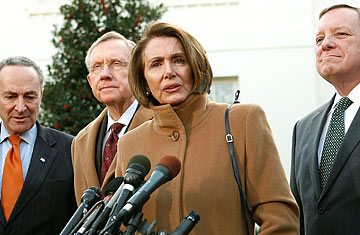
Democratic congressional leaders, from left, Senator Charles Schumer, Senate majority leader Harry Reid, Speaker of the House Nancy Pelosi and Senate majority whip Richard Durbin brief the media after a meeting with President Obama at the White House on Dec. 9, 2009
The voters have spoken: they would like 8 million jobs created now, please. And without adding a penny to the deficit, because all that debt is freaking them out. Sure, it seems like a pipe dream. But Democrats — facing double-digit unemployment and an increasingly grim electoral landscape — seem determined to achieve both, or at least lose trying.
President Obama argued in a speech at the Brookings Institute on Tuesday, Dec. 8, that the two are not mutually exclusive. "There are those who claim we have to choose between paying down our deficits on the one hand, and investing in job creation and economic growth on the other," he said. "This is a false choice. Ensuring that economic growth and job creation are strong and sustained is critical to ensuring that we are increasing revenues and decreasing spending on things like unemployment insurance so that our deficits will start coming down." In other words: spend now to save later.
The problem for Obama is that the spending has to start paying sizable dividends for the economy and employment by next fall, or else it will be too easy for Dems to be painted as bankrupting their children's future. Congress is raising the debt ceiling now by a whopping $1.8 trillion to avoid having to raise it again just before the elections, and is creating a deficit-reduction commission. In the same vein, Democrats are trying to push through as much spending as they can now so the programs' impacts will be felt before next year's elections. They're also being careful not to allocate new funds; to pay for their estimated $75 billion–to–$150 billion new-jobs bill — expected to pass the House next week — Democrats are taking money from the bank-bailout fund, which still has $300 billion left. Republicans are criticizing the move since the so-called TARP funds are meant to be loans that are supposed to help trim the deficit when they're paid back. "It's a huge shell game to try and give political cover to the fact that [Obama] wants to create a new stimulus program," New Hampshire's Judd Gregg, the top Republican on the Senate Budget Committee, told ABC News online program Top Line.
Despite their free-spending habits under the Bush Administration, Republicans have latched on to the issue of deficits as a subject they feel will help them next November. On everything from the stimulus to health care to — fairly or not — the bank bailout, they have beat a steady drum of disapproval all year. And their critiques are starting to have an impact. An ABC News poll found that only 42% of voters approve of the way Obama is handling deficits, compared with 53% who disapprove; that's a reversal from March, when 52% approved and 43% disapproved.
The criticism is wearing thin with the President. At an Oval Office meeting Wednesday, Dec. 9, with leaders from both parties, Obama took exception to Michigan Republican Representative Dave Camp's complaints that his ambitious agenda was scaring businesses and endangering the economy. "You're the ones trying to scare the American people," Obama snapped. "No, your policies are what's scaring them," interjected House minority whip Eric Cantor, a Virginia Republican who Thursday sent Obama a letter urging him to veto the $447 billion omnibus appropriations bill passed by the House earlier that day. The Senate is expected next week to take up the measure, which combines six appropriations bills; if Congress had failed to pass it before the new year, funding for a dozen different departments — from the Veterans Administration to the Transportation Department — would have abruptly stopped. The heated exchanges, in which Obama challenged his Republican colleagues to prove that their idea of freezing spending would be better for the fragile economy, are a preview of the debates that will be held across the country as Democrats up for re-election — all of the House and a third of the Senate — go home and defend one of the most expensive years in U.S. history.
The Administration's goal had been to get most of the spending done by the end of 2009 — though health care and a supplemental war bill are bound to slip into next year — so that Obama can turn the page at his annual State of the Union address, traditionally held in late January or early February, and focus on his plan to bring down deficits. But before he starts talking about saving money, the Democrats have a slateful of spending to pass: $30 billion for popular business tax breaks; $210 billion to prevent drastic cuts to doctors' Medicare reimbursement rates; the $848 billion health care reform legislation; between $75 billion and $150 billion for a jobs bill; the $447 billion "jobs-creating" omnibus appropriations bill, as House Speaker Nancy Pelosi called it; $40 billion for the war in Afghanistan; and the $636 billion defense appropriations bill. Conservatively, that's a whopping $2.3 trillion in legislation — much of it unpaid for. All this means that Democrats will probably have little money left to play with next year and will just have to hope that the seeds they're sowing now keep voters from thinking too much about the cost.
